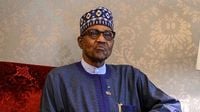Former Nigerian president Muhammadu Buhari died on Sunday, July 13, 2025, at the age of 82 in a London clinic after a prolonged illness, according to a presidential spokesperson. Buhari, a towering figure in Nigeria's political landscape, was the country’s first opposition candidate to unseat an incumbent president through the ballot box, marking a historic milestone in Nigeria’s democratic journey.
Buhari’s death drew condolences from Nigeria’s current president, Bola Ahmed Tinubu, who described him as “a patriot, a soldier, a statesman” with a “deep commitment to the unity and progress” of the nation. Tinubu ordered Vice President Kashim Shettima and his chief of staff to travel to London to bring Buhari’s body home for burial, expected to follow Muslim rites in his home state of Katsina.
Born on December 17, 1942, in Daura, Katsina State, Buhari was a Fulani Muslim who began his military career at 19. He received officer training in Kaduna, the United Kingdom, India, and the United States. His early military career coincided with a turbulent period in Nigeria, including the 1966 coup and counter-coup. By the mid-1970s, Buhari had risen to prominence, becoming military governor of the north-east in 1975, a region later plagued by Boko Haram insurgency.
In 1983, Buhari seized power as a military ruler through a coup that overthrew the democratically elected President Shehu Shagari. His regime launched a rigorous “War Against Indiscipline,” targeting corruption and inefficiency. Approximately 500 politicians, officials, and businessmen were jailed during his 20-month tenure. He famously enforced strict public order, including mandating neat queues at bus stops and punishing tardy civil servants with frog jumps. However, his government was also marked by human rights abuses, press restrictions, and the imprisonment of cultural icon Fela Kuti on dubious charges.
Buhari’s first military rule ended in August 1985 when he was ousted by General Ibrahim Babangida and subsequently imprisoned for 40 months. Following his release, Buhari spent decades in political opposition, running unsuccessfully for president several times before his historic victory in 2015.
His 2015 win was a landmark moment in Nigerian politics, as he became the first opposition candidate to defeat an incumbent president since the return to multiparty democracy in 1999. Buhari campaigned on promises to tackle corruption, restore security, and improve the economy. His appeal was particularly strong among the northern poor, known as the talakawa, who saw in him a disciplinarian capable of addressing the Islamist insurgency and government graft.
Despite initial optimism, Buhari’s presidency was fraught with challenges. His administration coincided with a global slump in oil prices, triggering Nigeria's worst economic crisis in decades. Critics, including economic analyst Bismarck Rewane, pointed to Buhari's limited grasp of modern economics and reluctance to embrace free-market policies as factors that deepened the recession. Buhari notably resisted devaluing the naira for months, which worsened investor confidence and widened the gap between official and black market exchange rates.
Security issues worsened under Buhari’s watch. Boko Haram remained a persistent threat, with its factions, including those aligned with the Islamic State, continuing deadly attacks. Central Nigeria saw escalating violent clashes between farmers and ethnic Fulani herders, a crisis exacerbated by accusations that Buhari, himself a Fulani, was not tough enough on the herders. Banditry in the northwest led to the abduction of hundreds of secondary school students, further undermining public safety.
Human rights abuses by security forces also marred Buhari’s tenure. The Nigerian army was implicated in the killing of 350 Shiite Muslims in 2015 and faced widespread criticism for opening fire on peaceful anti-police brutality protesters at Lagos’s Lekki tollgate in October 2020. This incident sparked nationwide unrest and international condemnation, highlighting ongoing tensions between the government and civil society.
Economically, Buhari’s policies echoed his earlier military era. One controversial move was the ban on rice imports aimed at boosting local agriculture. While well-intentioned, this policy caused rice prices to skyrocket from 7,500 naira ($5) per 50kg bag under his predecessor to 60,000 naira, fueling hunger and discontent among many Nigerians. The nickname “Baba go slow” emerged during his presidency, referencing the six-month delay in appointing his cabinet after the 2015 election and perceived sluggishness in addressing pressing issues.
In 2023, Buhari’s administration implemented the “naira swap policy,” which involved confiscating trillions of old naira notes and replacing them with new ones. Intended to curb illicit money influence in elections, the policy led to cash shortages and hardship for millions reliant on cash transactions. The Supreme Court suspended the policy days before the 2023 election, which was narrowly won by Buhari’s party successor, Bola Tinubu.
Buhari’s health was a recurring concern throughout his second term, with prolonged absences and medical trips to London fueling speculation about his fitness to govern. Despite this, he remained a key figure in Nigerian politics until leaving office in 2023. Afterward, he retired to his hometown of Daura, continuing periodic medical visits abroad.
Throughout his political life, Buhari was known for his austere, no-nonsense demeanor and a reputation for personal honesty—a rarity in Nigerian politics. He married twice, first to Safinatu Yusuf from 1971 until her death in 1988, and then to Aisha Halilu in 1989. He fathered ten children.
Reflecting on Buhari’s legacy, President Tinubu praised his “quiet strength, profound integrity, and unshakable belief in Nigeria’s potential,” underscoring a career marked by both steadfast discipline and contentious governance. Buhari’s journey from military ruler to “converted democrat” encapsulates the complexities of Nigeria’s political evolution, leaving behind a nation grappling with the challenges he sought to confront but never fully overcame.

